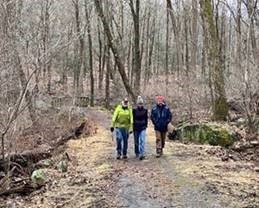Main Content
Michele Bakacs, Rutgers Cooperative Extension
The COVID-19 pandemic was an especially stressful period for everyone and many found themselves looking for solace in nature during the quarantine. Stress levels skyrocketed in my house with 2 young boys doing virtual school, my husband doing telemedicine at home, and me suddenly having to be an expert in online learning. We’ve always been an outdoorsy family, but I took for granted the benefits we came away with.. and how long they lasted after being in nature. Faced with extraordinary stress, I started to pay attention to how much better we felt after having been in the woods or after wading in a stream or pond. Since then, I have been exploring the benefits of “ecotherapy”.
According to the website WebMD® “Nature therapy, also called ecotherapy, is the practice of being in nature to boost growth and healing, especially mental health. You might also hear it called green care, green exercise, green therapy, or horticulture therapy” (Laguaite, 2021).
There are endless studies on the health benefits from ecotherapy related techniques for treating hypertension, obesity, post-surgical recovery, depression, stress, and post-traumatic stress disorder. When it comes to stress, one review article from the journal “Complementary Therapies in Medicine” examined 12 studies and concluded that nature exposure has been widely shown to have a positive effect in reducing stress, both perceived and physiologic, such as a reduction in blood pressure (Shuda et al., 2020).
Another review article from the journal “Landscape and Urban Planning” examined 40 peer reviewed publications focused on forest exposure and indicated that spending time in a forest for 2 hours lowers blood pressure, but the effect could be seen with as little as 30 minutes, although not to as great an extent (Cheng, et al., 2021). This is important, as stress is the common risk factor in 75-90% of diseases, including cardiovascular and metabolic diseases, neuropsychiatric and neurodegenerative disorders, and cancer (Cohen et al. 2007).
One article examined the use of forest therapy as an approach to managing stress in middle-aged working women- research subjects with whom many can relate (Rajoo, 2020). This study examined Malaysian working women who participated in a 3 hour forest therapy session. After the session, their blood pressure was significantly reduced and this result was sustained for 3 days.
In addition to stress reduction, spending time outdoors may also help boost your immune system. Although nature-based therapy may be new in western societies, Japan has understood the benefits of “forest bathing” or shinrin-yoku for decades.
Forest bathing means taking in the forest through your senses (Li, 2018). One study in Japan examined the notion of forest bathing as a mechanism for boosting the immune system with “natural killer cells” that have been reported to kill tumors or virus-infected cells. The study showed that the mean values of natural killer (NK) activity on forest bathing days were significantly higher than those on non-forest bathing days. In addition, the NK activity lasted 30 days after the trip. The authors noted that phytoncides (airborne chemicals that plants give off to protect themselves from insects) released from trees, and the decreased production of stress hormones, may partially contribute to the increased NK activity.
Many studies show that ecotherapy health benefits last many days and in some cases weeks! That’s good news for those who work full time and may be stuck in an office.
If you are looking to take advantage of the health benefits nature has to offer, make scheduling time in nature a priority. Put it on your calendar… and stop reading this article! Put down your phone or tablet and go outside. Visit an urban park with a forest or stream or, if you have the time, explore some of our beautiful state and county parks. Pick one that has passive recreation with trails.
When you come back, Joanne Kinsey, Associate Professor and FCHS Educator with Ocean and Atlantic Counties, gave some great advice on the role of nature and the outdoors in creating mindfulness in her April 5th Earth Day, Every Day session titled “Infusing Ecotherapy Into Your Life” available here- envirostewards.rutgers.edu/Earth-Day.html.
Remember that making every day, Earth Day also means practicing self-care, so engage in ecotherapy by immersing yourself in nature and breathing in the phytoncides!
References and Additional Resources
“Immerse Yourself in a Forest for Better Health” NYS Department of Environmental Conservation. Accessed June, 2021 www.dec.ny.gov/lands/90720.html
Cohen, S., D. Janicki-Deverts, G.E. Miller (2007) “Psychological stress and disease” JAMA, 298 (14): 1685-1687, 10.1001/jama.298.14.1685
Keeren Sundara Rajoo, Daljit Singh Karam, Nor-Fadilah Wook, Mohd-Zaki Abdullah (2020) “Forest Therapy: An environmental approach to managing stress in middle-aged working women”. Urban Forestry & Urban Greening, 55: doi.org/10.1016/j.ufug.2020.126853
Laguaite, Madeline (2021) “Do you need a nature prescription?” WebMB Accessed, June, 2021 www.webmd.com/balance/features/nature-therapy-ecotherapy
Li, Qing (2018) “Forest bathing is great for your health. Here’s how to do it.” Time Magazine Accessed June, 2021. time.com/5259602/japanese-forest-bathing/
Quincy Shuda, Michael E. Bougoulias, Rebecca Kass, (2020) “Effect of nature exposure on perceived and physiologic stress: A systematic review”. Complementary Therapies in Medicine, 53: doi.org/10.1016/j.ctim.2020.102514
Xiaoqin Cheng, Junxiu Liu, Hongwen Liu, Shasha Lu (2021) “A systematic review of evidence of additional health benefits from forest exposure”, Landscape and Urban Planning, 212: doi.org/10.1016/j.landurbplan.2021.104123
